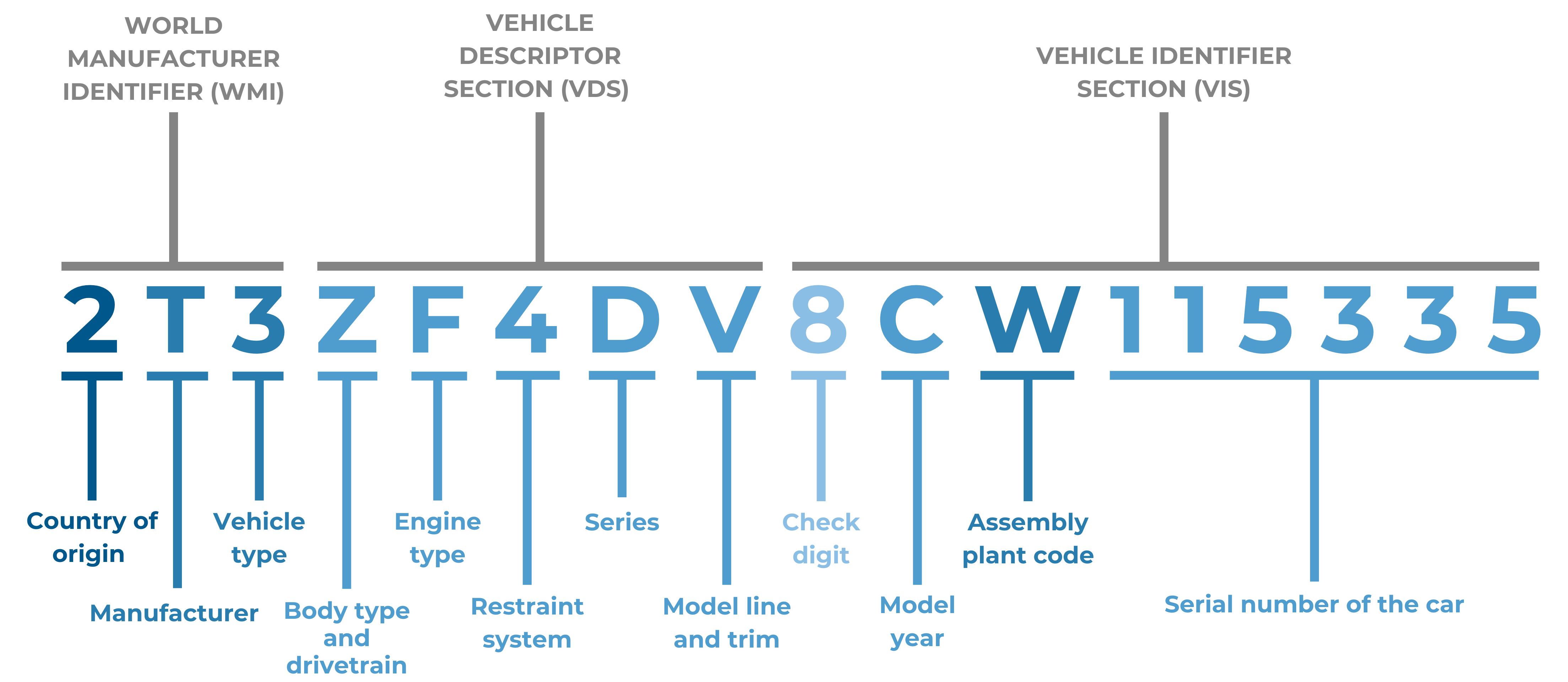
Ever wonder if your Toyota was born in a factory that also makes forklifts, or if it secretly dreams of being a Supra? Your Toyota VIN Code holds all the answers. Unraveling its mystery with a Toyota VIN checker or Toyota VIN code check can reveal your car’s past secrets before you commit to a used ride.
A Toyota Vehicle Identification Number (VIN) is a 17-character code that holds essential details about your car. Moreover, this unique code, with the help of a Toyota VIN code check, reveals the vehicle’s origin, key features, and past history. Understanding how to read a VIN is crucial, especially when purchasing a used Toyota, confirming its authenticity, or checking for recalls.
In this guide, we break down each digit, ensuring you can quickly VIN code check Toyota information.
Protect Your Ride—Verify Your Toyota’s Recall Status
What is a Toyota VIN?
A Toyota VIN works like a fingerprint, ensuring every car is unique. Moreover, this code mixes letters and numbers in a specific format set by the National Highway Traffic Safety Administration (NHTSA). As a result, each Toyota has a distinct VIN, which provides helpful details about its manufacturing and history.
Toyota VIN Structure: Understanding the 17 Digits
A Toyota Vehicle Identification Number (VIN) has 17 characters. If entered on a Toyota VIN code check, each section reveals different details about the vehicle’s origin and features.

1. World Manufacturer Identifier (WMI) – Digits 1 to 3
The 1st Digit represents the country of origin.
The 2nd Digit identifies the manufacturer.
The 3rd Digit indicates the vehicle type.
2. Vehicle Descriptor Section (VDS) – Digits 4 to 9
These six characters describe the model, body type, engine, and safety features. However, their positions can change by manufacturer. Generally, here’s how they are structured.
- 4th Digit: Body Type & Drive Wheels
- 5th Digit: Engine Type
- 6th Digit: Restraint System
- 7th Digit: Series
- 8th Digit: Vehicle Line & Make
- 9th Digit: Check digit used to confirm the VIN’s authenticity
3. Vehicle Identification Section (VIS) – Digits 10 to 17
This section gives more details. For example, it includes the model year, assembly plant, and a unique serial number.
- 10th Digit: Model year
- 11th Digit: Assembly plant code
- 12th – 17th Digits: Unique serial number assigned by Toyota
Why is the Toyota VIN Important?
Ensure Vehicle Safety & Legal Compliance
A Toyota VIN code check helps identify recalls, ensuring safety while also meeting both state and federal regulations.
Avoid Costly Repairs, Fraud, & Stolen Vehicles
It detects recall-covered repairs, preventing surprise expenses. Additionally, it flags stolen cars and VIN cloning fraud.
Verify Vehicle History & Prevent Odometer Rollback
You can uncover past accidents, flood damage, or salvage branding, which may indicate serious hidden risks.
Boost Resale Value & Buyer Confidence
A clean VIN history, free of recalls, and verified maintenance records help keep a Toyota’s resale value high.
Confirm Authenticity of Parts & Spot Lemon Cars
It checks if the engine, transmission, and other key parts match factory records, avoiding frequent breakdowns.
Optimize Insurance & Financing Approvals
A spotless history lowers insurance costs. On the other hand, hidden issues could lead to loan rejections.
Simplify Cross-Border & Online Car Purchases
When buying out of state or internationally, a VIN check ensures legal registration and prevents unexpected delays.
How to Do a Toyota VIN Code Check
To decode your Toyota’s VIN, follow these easy steps:
First, locate the VIN on the dashboard, driver’s side door frame, or vehicle documents, such as the title or registration.
After that, enter the VIN into an online Toyota VIN Checker tool for instant results.
Finally, review the report carefully to find details about recalls, vehicle specifications, and its complete history.
| Financial and Legal Status | Check for unpaid loans, liens, or theft reports. If ignored, these issues could cause legal trouble. |
| Damage and Accident History | Find out if the car had major damage. For example, fire, flood, salvage title, or lemon law buybacks. This information helps you avoid costly repairs later. |
| Recalls and Defects | Look for any open recalls. Some involve serious safety risks, such as faulty airbags, brakes, or fuel systems. Fixing these problems is essential for your safety. |
| Safety Ratings | Review crash-test ratings from IIHS-HLDI and NHTSA. Higher ratings mean better protection in an accident. |
| Vehicle Specifications and Warranty | Double-check the engine type, trim level, and features. Also, find out if the factory or extended warranty is still valid. That way, you know what repairs may be covered. |
| Market Value and Ownership Cost | Compare prices with similar models. This helps you avoid overpaying or getting stuck with a bad deal. |
| Title and Sales History | Make sure the title is clean. If not, past owners may have left behind hidden problems that could cost you later. |
| Odometer Fraud and Mileage Discrepancies | Verify that the mileage matches service records. Otherwise, rollback fraud or tampering might be a serious concern. |
| Previous Use | Check if the car was a rental, fleet, or taxi. Typically, these vehicles have more wear and tear, which may lead to higher maintenance costs |
Conclusion
When you VIN code check Toyotas, it helps you make smarter choices when buying a car. Plus, it lets you verify its history while checking for safety issues. That way, you can avoid hidden problems before making a purchase. So, don’t wait! Use a Toyota VIN checker to unlock key details about its manufacturing and past.
For a free Toyota VIN check, visit VinCheck.info. Then, enter your vehicle’s identification number to get instant details today!